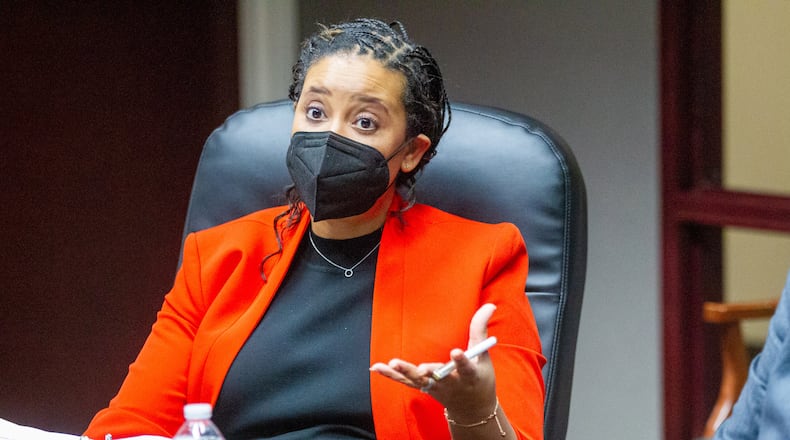Federal officials voiced concern Thursday about the high numbers of Medicaid recipients who are losing coverage as Georgia and other states begin work to drop beneficiaries who no longer qualify.
Medicaid is the government health insurance program for poor children and some adults. It funds more than half of Georgia births. Children could be especially hard hit by the renewal process. As of 2019, 56% of Georgia Medicaid enrollees were children up to and including 18 year olds, according to KFF, a nonprofit research organization.
Throughout the three years of the public health emergency declared for the pandemic, no one on Medicaid had to update their paperwork to show they still qualified. As a result, the rolls grew so that Medicaid now covers 2.8 million Georgians, or one-quarter of the state’s population. Since the emergency was lifted earlier this year, all states must now re-evaluate every Medicaid recipient and drop those who no longer qualify or who don’t complete the required paperwork.
What has experts especially concerned is the expectation that many, perhaps even the majority of those disenrolled, will be dropped because of mistakes or bureaucracy, even though they still qualify. If people don’t respond to the warning notices and re-file their application, they’re dropped from coverage.
“Before the pandemic some people would lose Medicaid coverage every year during the regular renewal process, and that included kids and families who were eligible but got caught in the red tape,” the nation’s top Medicaid official, Centers for Medicaid and Medicare Services Administrator Chiquita Brooks-LaSure, told Georgia reporters during a press conference Thursday. “We’re deeply concerned about eligible people losing health care coverage during the Medicaid renewals process.”
Her deputy in Washington, Dan Tsai, said solid data on how many recipients have already been disenrolled wasn’t available for Georgia yet. But other states were showing as many as 80% of those disenrolled during the renewal process may have been cut because of bureaucracy — meaning they might still qualify for the coverage, but they failed to update their information with the state, or the state failed to log their response, or some other problem with the process.
One of officials’ greatest concerns is not knowing how to reach people. If mailing addresses or phone numbers have changed, they may miss notes asking them to resubmit their information. And changing their address with their doctor doesn’t mean that Medicaid knows.
“One thing that we’re finding is that a lot of people on the ground are not even aware of what’s going on and there’s a communication gap between the language that is coming out from the states and what people are actually thinking is going on,” said Antrell Tyson, based in Atlanta and director of the eight-state U.S. Department of Health and Human Services region that includes Georgia.
Early data suggested that Georgia may be having a major problem with red tape.
The Georgia Department of Community Health oversees Medicaid and contracts with the Department of Human Services to do the case work of reevaluating people.
Georgia has scheduled its 2.8 million cases to be evaluated in batches over the course of 14 months.
Based on data from June 9, Georgia has cut off Medicaid health insurance for more than 1,500 people after reviewing its first group of about 8,000 enrollees to make sure they’re still eligible.
Almost all of those disenrolled were because of problems with the application process, according to the two state agencies.
DHS and DCH, asked about the data Thursday, did not provide any updates. A spokeswoman for DHS, Kylie Winton, called the re-evaluations “an incredible undertaking” and detailed the multiple methods they are using to reach out to beneficiaries individually, and through ad campaigns.
As of June 9, the state still was working on more than 4,000 cases, even as they’ve moved into the next batch of cases, numbering more than 200,000 recipients. The federal officials Thursday did not voice concern about the state being behind. Rather, they encouraged states not to rush the process.
“States need to do everything in their power, above and beyond the federal minimum, to keep people covered,” Tsai said, citing a letter the Biden administration sent to governors. “And that means taking folks’ time, not rushing the process of renewals across the next year, because rushing it will lead to mass confusion and people losing coverage.”
MEDICAID RENEWAL TIPS
All Medicaid recipients must renew their eligibility status every year in Georgia. That requirement was suspended during the pandemic. But now it’s back.
- The state has established a website with tips for enrollees: https://staycovered.ga.gov/
- Enrollees should start by logging into their Gateway accounts to manage the redetermination process.
- If you’re on Medicaid, make sure that the state has your updated mailing address.
- Make sure to check your mail and keep an eye out for any letters from the state.
About the Author
The Latest
Featured



